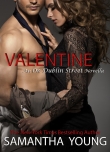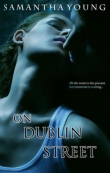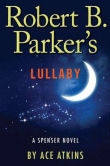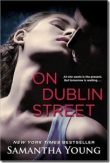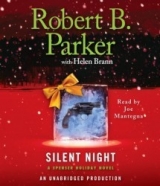
Текст книги "Silent Night"
Автор книги: Robert B. Parker
Соавторы: Helen Brann
Жанры:
Криминальные детективы
,сообщить о нарушении
Текущая страница: 6 (всего у книги 9 страниц)

I CALLED JUAN ALVAREZ and made an appointment to see him at his office, which was on Exchange Place on State Street. The building was a tall glass column with a black marble entrance. Inside the heavily gilt-painted lobby were the biggest potted palms I had ever seen outside the set of Aida. Over in one corner was a huge fir tree decorated with blue and silver balls for Christmas, which clashed with the brushed-gold elevator door.
I got off at the twenty-fourth floor. The elevator doors opened directly into a spare modern reception area. A young woman with strawberry-blond hair, brown eyes, and matching freckles sat behind a black granite workstation.
“I’m here to see Mr. Alvarez,” I said.
“You must be Mr. Spenser?”
“I am,” I said, flashing her what I hoped was a roguish grin.
She was not moved. “You’re a bit late for your appointment. Mr. Alvarez doesn’t like to be kept waiting.”
So young. So jaded.
She got up and led me down a hallway and through a tall double door. Juan Alvarez got up from his half-crescent desk. “Spenser. Come in, come in.” He waved me in. “Alice, what can we get for Spenser? Coffee, tea, or something stronger?”
He was wearing an expensive charcoal-gray bespoke suit with a faint chalk stripe and a floral Turnbull & Asser tie. His desk was burnished oak. On top of the desk were several neat piles of papers and three clocks showing different time zones.
“No, thanks,” I said.
“Let me give you the nickel tour. I can’t get enough of this view.” He led me around the large room, which had a panoramic view of Boston Harbor and, on a particularly clear day, probably a good chunk of Newfoundland. The paintings on the walls reeked of expensive original. Picasso, Bacon, a Turner. Obviously not a discerning collector, but maybe it didn’t matter when you had lots of money.
He waved me to one of the chairs opposite his desk, and we sat down. “Before you tell me why you are here, please allow me to apologize for my outburst the other day. I regret I came on a little strong. I have always been a very private man, and I find any intrusions into my affairs upsetting.” He smiled.
I smiled. Amigos again. Just like that.
“Apology accepted, Juan,” I said. “My innate curiosity isn’t always understood or appreciated. Some people have told me I can be annoying.”
He chuckled, but he didn’t disagree.
I looked around. “This is a swell office,” I said. “What type of business gets you the picture-postcard view?”
“I run an import/export business. Art, textiles, some clothing, small leather goods.” He smiled some more, and I smiled back. After a moment, he said, “And to what do I owe the honor of your visit today?”
“I’ve been thinking of relocating my office, and I was wondering if any of those houses over by Jackie’s Street Business are for sale. I’d even consider renting, if it got my foot in the door.”
Alvarez smiled again. His teeth were white and even. Maybe I’ll ask for the name of his dentist, too.
“An interesting concept,” he said. “How many employees do you currently have?”
“One,” I said, “including me. But I aspire to growth. And I have plenty of files.”
Alvarez leaned back in his chair, put his arms on the armrests, and studied me.
“Your abiding interest in those properties intrigues and perplexes me, Spenser.”
“And annoys?” I said.
“Amuses. Those buildings are simply investment properties, nothing more.”
“I’m just a real estate junkie,” I said. “I hate to miss a great investment opportunity.”
“And an astute investor such as yourself would certainly check the public records, so you would know that I have recently transferred ownership of all of my Boston holdings. You would therefore know that I am no longer the legal owner of those buildings.”
“Damn,” I said. “Why unload such swell investments all of a sudden?”
“Not all of a sudden. It was the result of months of planning by my financial advisers. I hate to disappoint you, Spenser, but it was merely some long-overdue estate planning.”
“I’m intrigued, Juan,” I said. “Why the estate planning? Just contract a terminal disease? Plan to go skydiving? Recent unsettling visit from Marley’s ghost, perhaps?”
Alvarez smiled. “Nothing like that. I am healthy and secure. But I do believe in looking ahead.” He spread his arms and shrugged. “One never knows what the future might bring. It is best to be prepared.”
“So if I’m stuck on that neighborhood, Jackie’s place is the only one available?”
“Good luck with that, Spenser. Jackie should have sold that building long ago, but he is far too stubborn.”
“Aren’t you the number-one fan of Street Business? Don’t you provide most of its support?”
Something dark clouded his face. Then it was gone.
“I am not a fan of Street Business. But I believe in supporting my family. That means I support Jackie. Funding Street Business is the manifestation of that support. But it is a financial black hole and an ill-conceived fantasy of a naive and foolish mind.”
“So you wouldn’t be saddened if it disappeared tomorrow?”
“I have done all I can to sustain Street Business. Jackie and my family know this. If it fails—when it fails—it will be through no fault of mine.”
“Well,” I said. “So much for my expansion plans. Thank you for your time, Juan.”
Alvarez stood and followed me to the door. “A pleasure to see you, Spenser. I am reminded that I have yet to invite you and Dr. Silverman to my home in Weston. I will arrange that soon.”
“I look forward to it,” I said.
The receptionist was at her desk when I left Juan’s office. She smiled. Perhaps I was getting to her.
“Leaving already?” she said. She looked disappointed.
“‘Promises to keep,’” I said. “‘And miles to go before I sleep.’”

SUSAN AND I RECEIVED AN engraved invitation from Juan Alvarez to join him at his farm in Weston for the Sunday before Christmas.
The invitation was on thick, expensive card stock with a gold border and decorated with tasteful Christmas accents of wreaths and gold horns. According to the invitation, Juan Alvarez requested the presence of our company at a Christmas celebration at the barn. Drinks at noon. Brunch at twelve-thirty. Tennis at one. To benefit the USTA and the USWTA. There was a reply card where we could designate the amount we might donate, in increments of $5,000 per seat. Juan had slashed a line through the numbers and handwritten across the top, “Susan and Spenser, hope you will join us as my guests.”
“Does that mean we get in free?” I said.
Susan had her head in my lap and was holding the invitation up to the light so we could both study it. “Each one of these must have cost twenty dollars,” she said. She wore charcoal slacks and a form-fitting pewter blouse. A pewter jacket was thrown over the back of one of my chairs. She was transitioning out of her Dr. Silverman mode, but slowly.
“Ah, the tennis matches. When’s the last time we enjoyed one of those?” I said.
“They’re actually very entertaining, from what I understand,” Susan said.
“Is there a part where they give away giant silver chalices to the winners?”
“Perhaps. I’ve never actually seen one in person, only on TV.”
“I don’t know about this,” I said. “Carmen’s brand of tennis scares me.”
She raised her head from my lap and with the agility of a yogi turned it to look up at me. “Still overcoming a traumatic childhood tennis experience?”
“You should see her on the court. She doesn’t fool around.”
Susan sat up and took a sip of her pinot grigio, which had gone untouched on the table beside her. “No luck finding out who is causing Jackie his problems?”
“So far we know it’s not the Catholic church. They gave up trying to buy the houses on that street months ago, after Alvarez turned them down on their last and best offer.”
“And you think Jackie really cares about Street Business?”
“I do. But he appears to be the only one.”
“Not Juan?”
I shook my head. “Juan funds it out of a sense of familial obligation, but he doesn’t like it. He’s certain Street Business will ultimately fail, and he told me at least it won’t be his fault.”
“That’s consistent with what Carmen has told you about Juan. He has to be the good guy. He doesn’t want to be viewed as responsible for anything bad. He’s certain it will fail, and he needs to not be responsible for its failure.”
“True. But I think Juan has enough problems of his own right now without worrying about his little brother’s social experiment. Despite that calm exterior, I think Juan is feeling the pressure and knows he could be seeing his empire start to crumble. My poking around isn’t helping put him in a holiday mood, either.”
“So why invite you to his home? ‘Keep your friends close, and your enemies closer’?”
“If that were generally true in my business, I’d be invited to a lot more parties,” I said. “But it’s probably something like that. In any case, it’s an opportunity to see more and learn more. But that goes both ways.”
“What do you hope to learn?”
“I don’t know. But knowing more is better than not knowing more. I just have to keep poking around until I find out something useful. I just hope I’m smart enough to recognize a clue when I step on one.”

ON SUNDAY WE DROVE OUT to Weston. It was sunny, and the fresh snow gleamed across the meadows. I turned in at the Alvarez gates and continued on back to the barn, where there were already Porsche and Mercedes SUVs, a Bentley or two, and several Range Rovers. It was cold, 21 degrees, but the sun made it seem warmer.
Susan was dressed in black wool trousers and a cropped black leather jacket, and high-heeled black suede boots. I was wearing my gray wool slacks, a tweed jacket, and a dark gray turtleneck. Country Spenser.
We smiled at the other guests, and they smiled at us as we went into the barn.
A bar and tables and chairs were set up at either end. In the middle, wooden grandstands had been erected on either side of the tennis court. A string quartet dressed in Elizabethan attire was positioned in the front of the hayloft, playing Baroque music.
I nudged Susan and looked up. She followed my gaze, and we were silent.
“I don’t mean to sound elitist,” I said, “but wouldn’t a jug band be more appropriate?”
“Or Garth Brooks,” she said. “Maybe Juan doesn’t know that ‘country music’ doesn’t mean music from some other country.”
“Or some other century.”
She put her arm through mine, and we went toward the bar. To one side was the brunch table laden with large silver serving dishes and tureens waiting to be filled.
“Elegant,” I said. When we reached the bar, I ordered a Grey Goose martini, and a sauvignon blanc for Susan.
“Actually, I’ll have a Bloody Mary, very spicy, with extra lemon.”
“Should I be concerned?”
“Extreme circumstances call for extreme measures,” she said. “This crowd is right out of WASP central casting. How did they let me in?”
“We’re a forgiving people at Christmas,” I said. “Just don’t come back in January.”
“Hello, you two,” Juan Alvarez called out to us from beyond the bar. He walked toward us, resplendent in white tennis shorts, a white polo shirt with a monogram on the pocket, white Nikes, and a dangerous-looking black tennis racquet with a thick black handle. The country squire at play. If he couldn’t hit a small white ball with that weapon, we were in for a long afternoon.
Juan leaned down and kissed Susan on each cheek and then shook my hand. “Come with me. I’ll make sure you get good seats,” he said, leading us through the crowd. “Carmen does a wonderful job with these tennis matches.”
Juan waved his arm in the direction of two center-court seats. “Enjoy. When you’re ready, please go help yourself to the buffet. Now, if I may, I’ll catch up with you later,” he said, before heading in the direction of the local TV cameras set up at the other end of the barn. Their bright lights were clustered over a group of what I assumed were the celebrities Carmen had talked into participating in the event.
We could see Carmen coming through the crowd, trailed by a man with a microphone and two cameramen. She was wearing white shorts that showed a pair of long, well-muscled legs, and a navy blue V-neck top. Her long, dark hair was pulled back in a ponytail and tied with red, white, and blue ribbon. She looked up into the stands, saw us, and after a quick word with the reporter, ran up the stairs, taking them two at a time. “Hello there! I’m so glad to see you.” She gave Susan a kiss on the cheek and me an enthusiastic hug.
“I have to go warm up, but I wanted to say hi first. I really appreciate you coming out here for this.” She nodded in my direction. “I’ll bet you would rather do most anything else, wouldn’t you?”
“I’m considering this a research trip,” I said.
“Don’t mind him,” Susan said. “I’m looking forward to seeing what happens next.”
“Hey, Carmen!” a young woman called from behind us. Carmen turned. “Kim!” They embraced. “You made it! How’s the baby?”
“Fantastic! Hey, you look great. Retirement definitely agrees with you,” Kim said.
“Kim, let me introduce you to my friends. Susan and Spenser, Kim Clijsters.”
“Great to meet you,” Kim said. “Carmen, I’m going to clean your clock today. Love you!”
“So that’s what happens next,” I said.
“No,” Carmen said. “First mixed doubles. Two civilians, two pros. One set. Then one set of men’s singles, then one set between Kim and me. Then we all go home.”
“And how long do you think this orgy of tennis talent will take?”
“What do you think, Kim? Four, maybe five hours?” Carmen turned to Kim, who was laughing.
“I don’t know how well you know Carmen, but she’s a bad one. One hour, tops, unless we get into tiebreakers.”
“All right, time to get ready. Head over and get some crab cakes before they’re all gone,” Carmen said. The two friends walked off, arm in arm.
“She’s adorable,” Susan said. “All that talent, and a dimple, too.”
We made our way to the buffet table, where Susan put a small spoonful of vegetables and another of salad on her plate.
“Thanks for not showing me up,” I said, helping myself to prime rib, mashed potatoes, and glazed baby carrots.
We took seats at a table as the mixed doubles got under way. Juan was partnered with a woman I thought was Martina Navratilova. Playing opposite them were John McEnroe and Rita Fiore. I noted Rita’s white tennis costume, a fitted low-cut top and short pleated skirt, which showed off her spectacular legs. A little man sat atop the umpire’s chair while a man in a tan uniform flipped big plastic numbers.
Slide had been pressed into service as one of the ball boys. He ran back and forth across the rear of the court, his face a mask of concentration. A young girl in pigtails worked the other side of the court.
“I had no idea Rita played tennis,” Susan said.
“She’s a woman of many talents,” I said as I watched her smash a serve into the opposite court. Juan could only watch it go by.
“Forty love,” the umpire called. Rita and John were winning. It didn’t seem to be much of a contest.

WE FINISHED OUR MEAL and returned to our seats in the stands as the doubles were wrapping up. Rita and John had beaten Juan and Martina, though it had gone to a tiebreaker.
“I think now would be a good time to console Juan on his loss,” I said to Susan. “Keep my seat warm.”
Susan nodded. The crowd was loud and enthusiastic. I made my way through the throng to Juan. “Sorry about the match, but you put up a good fight,” I said.
Juan smiled. “Playing with Martina is honor enough.”
“You must be proud of Carmen for putting this all together. It’s quite a party.”
“She’s really something, don’t you think?” Juan said.
There was a tone of longing, perhaps, in his voice. As if he knew that he had lost her and he knew why and now his prize possession was soon to leave him. It didn’t matter that he was the one to send her away permanently. Maybe he even loved her. Pity me that the heart is slow to learn what the swift mind beholds at every turn.
On my way back to my seat I went over to one of the dark-skinned men who were watching the match. “You Martita’s brother?” I said.
He shook his head and pointed down the way to the next man standing guard. I walked over to him and stuck my hand out. “I’m Spenser. I took Martita and her baby to the health clinic last week, remember?”
The tall, heavyset man grinned at me, showing a lot of gold. “Muchas gracias, señor.”
“Sorry, I only speak a little Spanish.”
“I’m Marco. What can I do for you?” He kept his gaze on the tennis match while he was talking.
“I just wanted to say hello. Carmen tells me you’re the security guard here. That’s a pretty big responsibility, protecting all these people.”
Marco grinned. “I am but one of many. Mr. Alvarez has . . .” He stopped to count. “He has ten guards here.”
“But that’s because it’s a big event today, right?”
Marco shook his head. “No, we are ten to twelve most of the time. Three shifts of four men. Sometimes more, sometimes less when Mr. Alvarez travels. But mostly ten to twelve.”
“Good to know,” I said. “I’m sure you are well trained.”
“Sí,” he said, and his grin broadened. “And we are well armed.”
“Did Carmen tell you I’m a private detective? I use a Beretta. Easy to handle, gets the job done.”
“Smith and Wesson’s a good weapon for close range. We have a snub-nose .38 special every time. Or for the ankle, a .25 Beretta.” Marco was enthusiastic.
“Rifles?”
“For hunting. Not much for our work.”
A burst of static sounded from Marco’s right ear. I hadn’t noticed his earpiece. Marco listened, then leaned into a microphone at his shoulder and said, “Sí. On my way.
“I have to go now,” he said. “Nice speaking with you, Spenser. Thank you for helping Martita.”
I went back to where Susan was sitting just in time to see Carmen and Kim take the court.
The umpire stepped forward for the coin toss to determine the first serve. Kim won the toss, and she and Carmen took their places.
Kim bounced in place at the baseline. She looked across the net at Carmen to make sure she was ready to start.
Her first serve whizzed over the net and hit the line.
Carmen watched it go by. She smiled at Kim and walked to the other side of the court. Kim served again. Another ace. No smile from Carmen this time. Athletes are all the same. Friendship gives way to the competitive spirit every time.
Carmen took the next two points, then Kim served two more aces and took the first game. It was Carmen’s serve, and she made the most of it. Carmen rushed the net each time, ready to knock back every return. She won the second game without giving Kim a point. Sweat darkened the back of Carmen’s navy-blue top. Kim’s already pink cheeks grew pinker.
“Any chance we can leave without being noticed?” I said to Susan.
“So much for showing support,” Susan said.
“I know what you mean, but just watching this has exhausted me.”
Susan nodded. “Poor baby. We’ll be discreet.”
“Let’s hit it, honey bun,” I said.
And we did.

I WAS UNLOCKING THE DOOR to my office when I saw a shadow in the corner by the stairwell. It moved. I backed up and reached for my weapon.
“Slide,” I said. “What are you doing over there? Come on in.” I opened the door.
He gave me a quick smile before putting out his hand. Maybe Carmen taught him. I took it, and gravely we shook.
“Are you very busy, Spenser?” he said.
“Not too busy. Tell me what’s up,” I said.
Slide had on a new pair of jeans and a Red Sox sweatshirt, along with the same oversize navy peacoat.
“I want to get a present for Carmen,” he said. He looked at me, trusting that I would know exactly what the twenty-nine-year-old ex-mistress of a drug czar would fancy for Christmas.
“What’s our budget?”
He looked worried. He dug into his jeans pocket and brought out some crumpled bills and gave them to me. Twenty-two dollars of hard-earned money. “This should do it,” I said to him. “Follow me.”
We left my office and headed toward the kiosks at Downtown Crossing, a street mall in an area near where Filene’s Basement once welcomed tourists and shoppers from the suburbs. Now carts lined the center of the street, each one loaded with scarves, hats, ties, flowers, and cheap jewelry.
I moved purposefully ahead through the crowds of shoppers, Slide at my heels. The carts were draped with Christmas lights, and the holiday music blared from outdoor speakers.
I turned to check on Slide. His thin face was pale and drawn. I felt his hand reach out for mine, and together we went along, inspecting each cart for something that he thought would be right for Carmen.
Slide tugged my hand when we got to the jewelry cart. He picked up a tiny silvertone pin in the shape of a tennis racquet, edged with blue enamel. “How much,” I asked the young woman behind the cart. “Fifteen,” she replied through a thick wad of chewing gum.
“Can you gift-wrap this for us,” I said.
Slide’s face showed a mixture of happiness and relief to have found the pin. He took the small box with its glossy paper and bright ribbon, and for the first time he seemed unafraid of the crowd and the noise. He held his hand out for his change, and he shoved it and the box into his jacket pocket.
“How about a hot chocolate?” I said.
He nodded, and we made our way through the shoppers to the Emack & Bolio’s on State Street.
We sat at a café table, and I watched Slide enjoying the marshmallow on top of his hot chocolate. He mashed it with his spoon to make it last longer. It was serious work.
I remembered how my dad and uncles would take me for a treat at the drugstore. I could still taste the hot fudge that got chewy on the melting scoop of vanilla ice cream.
When we had finished, we stood on the sidewalk to say our good-byes.
“Thanks for your help, Spenser,” Slide said. “I think Carmen will really love this, don’t you?”
“I do,” I said. “How did you get in here from Weston?” I asked. “And how are you going to get home?”
“Got a ride from one of the men at the farm,” Slide said. “They come in most days to run errands. Now I’ll go over to Street Business. Either Joe or Frankie will give me a ride back.”
I watched him melt into the crowd and disappear down the street. I wasn’t sure how I felt about an eleven-year-old boy negotiating the city streets on his own. I know I had done it myself, once upon a time. I could almost hear Hawk chiding me for being so soft. But that was different. It was Christmas in Boston. A boy should be able to travel these streets, as he had before. It was a time of peace and goodwill and all that. In a perfect world, the boy was heading for home, and parents watched for him at the window. Different times, indeed.



